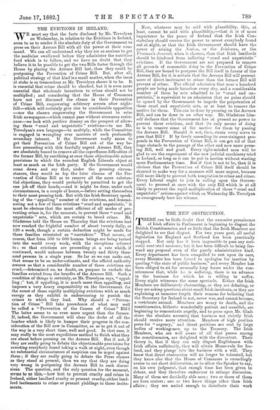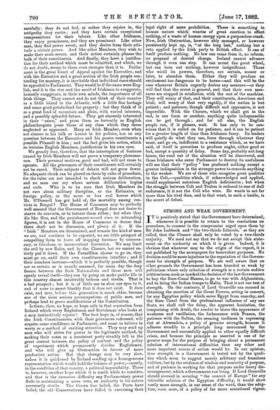THE NEW OBSTRUCTION.
THERE can be little doubt that the excessive prominence of Irish affairs in Parliament is beginning to disgust the British Constituencies, and as little that the Irish Members are delighted to see that disgust. For two years past, all useful legislation for England and Scotland has been practically stopped. Not only has it been impossible to pass any seri- ously contested measure, but it has been difficult to bring for- ward any proposal even of the purely administrative kind. Every department has been compelled to rest upon its oars, every Minister has been forced to apologise for inaction by quoting " the state of public business," and every Member has been obliged to sit for unusually long hours under the con- sciousness that, while he is suffering, there is no advance in the business for which he is willing to suffer. Every night witnesses the same spectacle. Either the Irish Members are deliberately obstructing, or they are debating, or they are asking questions abOut small Irish incidents, or they are explaining at immense length their reasons for believing that the Secretary for Ireland is not, never was, and cannot become, a vertebrate animal. Members are weary to death, and the constituencies, hitherto wonderfully patient and unselfish, are beginning to remonstrate angrily, and to press upon Mr. Glad- stone the absolute necessity that business not strictly Irish should receive more attention. Members of high position press for " urgency," and direct petitions are sent by large bodies of working-men up to the Treasury. The Irish Members, who are well aware of all that passes among the constituencies, are delighted with the discontent. Their theory is, that if they can only disgust Englishmen with Irish affairs sufficiently, they will obtain Home-rule for Ire- land, and they plunge into the business with a will. They know that direct obstruction will no longer be tolerated, but they know also that the House of Commons is exceedingly averse to cut short deliberation, or to allow the Speaker to say, on his own judgment, that enough time has been given to debate, and they therefore endeavour to enlarge discussion. Many of them are decidedly able men ; two or three of them are born orators ; one or two know things other than Irish affairs ; they are united enough to distribute their work
carefully; they do not feel, or rather they rejoice in, the antipathy they excite ; and they have certain exceptional compensations for their labour. Like other Irishmen, they enjoy prominence, and they are prominent. Like other men, they find power sweet, and they derive from their atti- tude a certain power. And like other Members, they wish to make their seats secure, and their action certainly pleases the bulk of their constituents. And finally, they have a justifica- tion for their method which must be admitted, and which, we do not doubt, seems to them even stronger than it is. Parlia- ment is the great Court of Appeal against the Executive, and with the Executive and a great section of the Irish people con- tending for mastery, it is inevitable that individual cases should be appealed to Parliament. They would be if the cases were Eng- lish, and it is the vice and the merit of Irishmen to exaggerate, honestly exaggerate, in their own minds, the importance of all Irish things. They cannot and do not think of their country as a little island in the Atlantic, with a little fine herbage and some good potato-land for property ; but they think of it as a great land of mountain and plain, with varied interests, and a possibly splendid future. They get sincerely interested in their " cases," and press them as fervently as English philanthropists press those of any class which they deem neglected or oppressed. Many an Irish Member, even when not sincere in his talk or honest in his politics, has on any question between the Executive and his poorer constituents a possible Plimsoll in him ; and the fact gives his action, which so irritates English Members, justification in his own eyes.
We greatly fear, therefore, that the interruption of business caused by Irish Members will not prove a temporary phenome- non. Their personal motives, good and bad, will not cease to operate. All the grievances of their constituents will certainly not be cured. Their subjects of debate will not grow fewer. No adequate check can be placed on them by rules of procedure, for the rules are not intended to check serious deliberation, and no man can say where serious deliberation begins and ends. Who is to be sure that Irish Members do not care about military discipline, or the Estimates, or foreign policy, or the more or less real horror which Mr. O'Donnell has got hold of, the mortality among con- -yids in Bengal ? The House of Commons may be perfectly well assured that the Government of Bengal does not desire to starve its convicts, or to torture them either ; but when they die like flies, and the punishment-record rises to astounding figures, it is not in the House of Commons to decree that there shall not be discussion, and plenty of it. If the " Irish " Members are determined, and remain the kind of men we see, and continue to be reported, we see little prospect of compelling them to leave off stopping business by unneces- sary, or frivolous, or inconvenient discussion. We may limit the evil by new Rules, and by the Closure, but we cannot en- tirely put it down. If the Parnellites choose to go on, they must go on, until their own constituencies interfere ; and if their numbers increase—which it is perfectly possible, though not so certain as is usually assumed, for some day the deep fissure between the Irish Nationalists and these men will openly reveal itself—they can by going on make public life in this country almost intolerably tedious and sterile. That is a bad prospect ; but it is of little use to shut our eyes to it, and of none to assert blankly that it does not exist. It does exist, and may, before this generation is much older, become one of the most serious preoccupations of public men, and perhaps lead to grave modifications of the Constitution.
Is there, then, no hope, or hope only in that separation from Ireland which every Englishman and Scotchman who looks at a map instinctively rejects ? The best hope is, of course, that the Irish Constituencies, with their grievances redressed, will acquire some confidence in Parliament, and cease to believe in worry as a method of exciting attention. They may send up men who will strive for power in the legitimate method, by making their votes as a consistent party steadily felt in the great contest between the policy of content and the policy of experiment which permanently divides Englishmen, and who will give up Obstruction in favour of more productive action. But that change may be very slow, unless it is quickened by Ireland sending up a homogeneous representation which would hold the balance of power,—nearly, in the condition of that country, a political impossibility. There is, however, another hope which it is worth while to consider, and that is the excessive difficulty any Parliamentary power finds in maintaining a mere veto, an authority in its nature necessarily sterile. The Crown has failed, the Peers have failed, the old Conservatives have failed in exercising their legal right of mere prohibition. There is something in human nature which wearies of great exertion to effect nothing, of a waste of human energy upon a purposeless crank. Now, Irish Obstruction, however ably managed, or however persistently kept up, is, " at the long last," nothing but a veto applied by the Irish party to British effort. It can of itself produce nothing. No law can come from it, no reform, no proposal of desired change. Ireland cannot advance through it even one step. It can arrest the great wheel, but can turn out nothing, however insignificant. Those who wield its powers, therefore, are certain, sooner or later, to abandon them. Either they will produce an excitement too dangerous to be borne—and this will be the case whenever Britain urgently desires any measure—or they will find that the arrest is general, and that their own mea- sures are stopped in retaliation, with the rest of the machine. They will weary of that, and their constituents, American and Irish, will weary of that very rapidly, if the nation is but patient ; and patience, though difficult and oppressive, is not impossible. With the Closure, which we shall get in the end, in one form or another, anything quite indispensable can be got through ; and for all else, the English people can, if it pleases, wait. It has only to be con- scious that it is called on for patience, and it can be patient for a greater length of time than Irishmen fancy. Its leaders will quietly do what they can, force through whatever they must, and go on, indifferent to a resistance which, as we have said, of itself is powerless to produce aught, either good or bad, except a quantity of delay. Some day, probably not long hence, the road out of the situation will be discovered, and those Irishmen who enter Parliament to destroy its usefulness will see that their "policy " has produced nothing except a greater indisposition in the stronger power to concede anything to the weaker. We are of those who recognise great qualities in the Celt,—qualities which, if acknowledged and applied, would supplement notorious English deficiencies ; but when the struggle between Celt and Teuton is reduced to one of dull endurance, it is not the Celt who wins. He wants to act far more than his rival does, and in that want, in such a battle, is the secret of defeat.



































 Previous page
Previous page